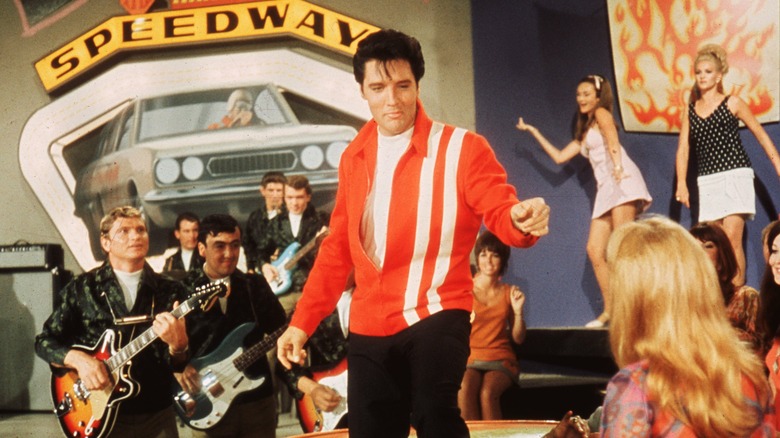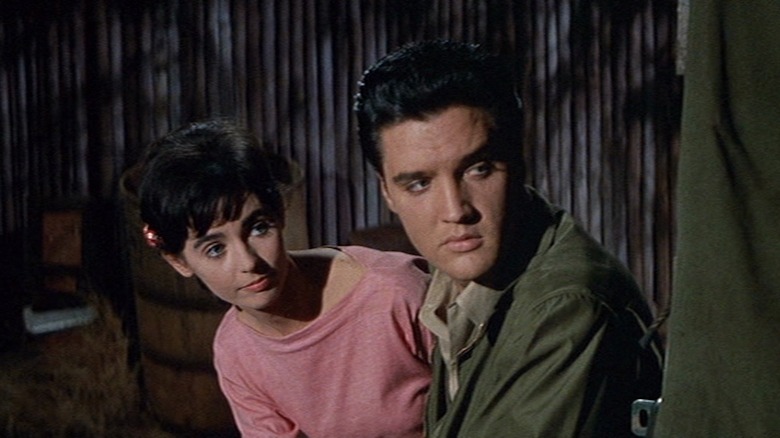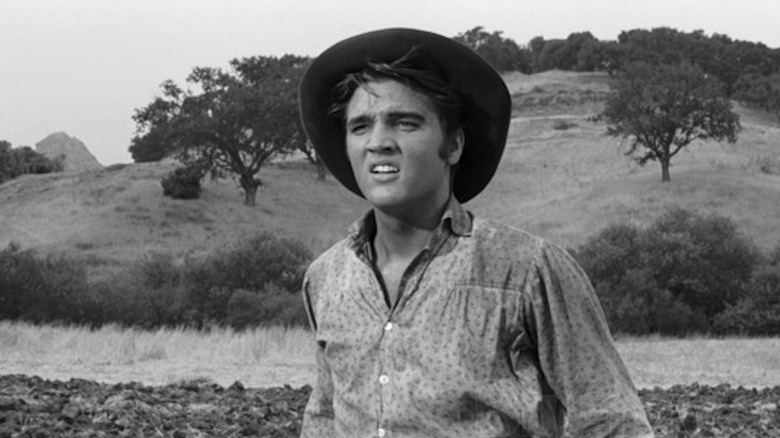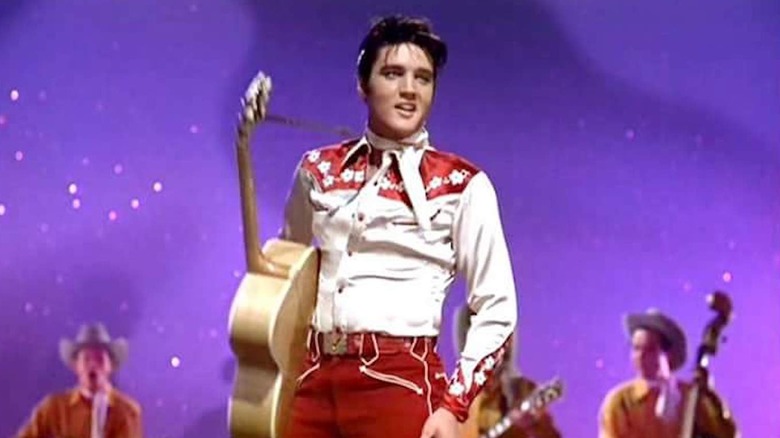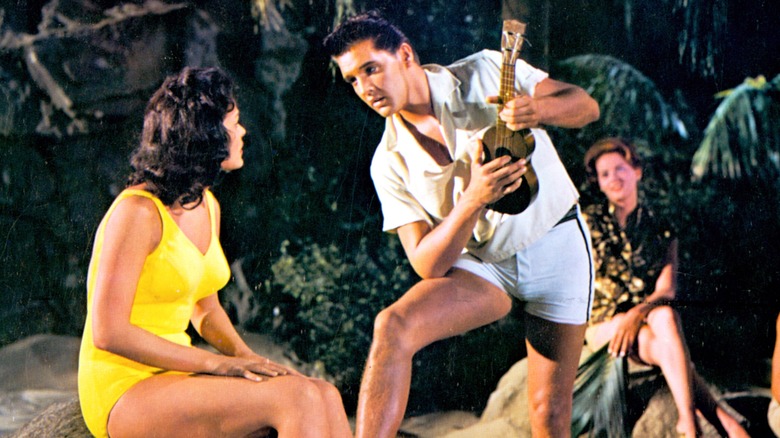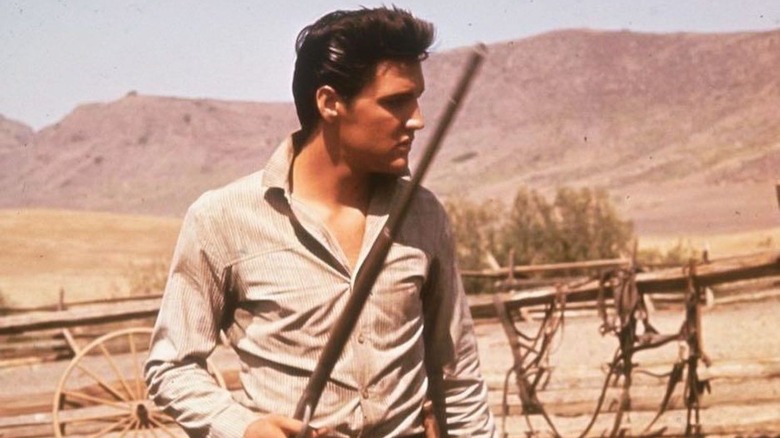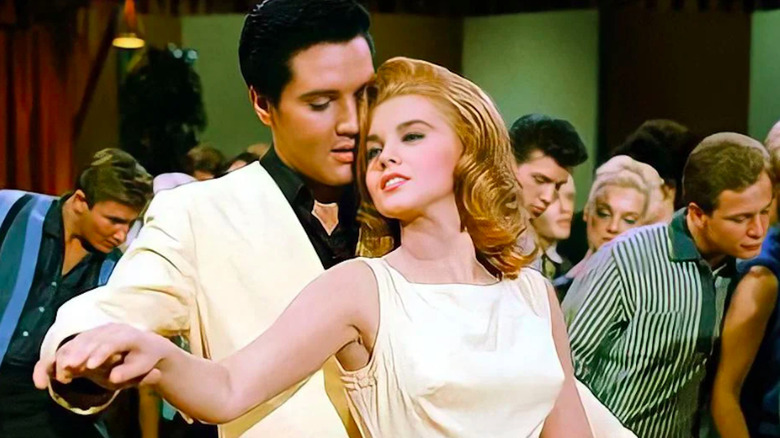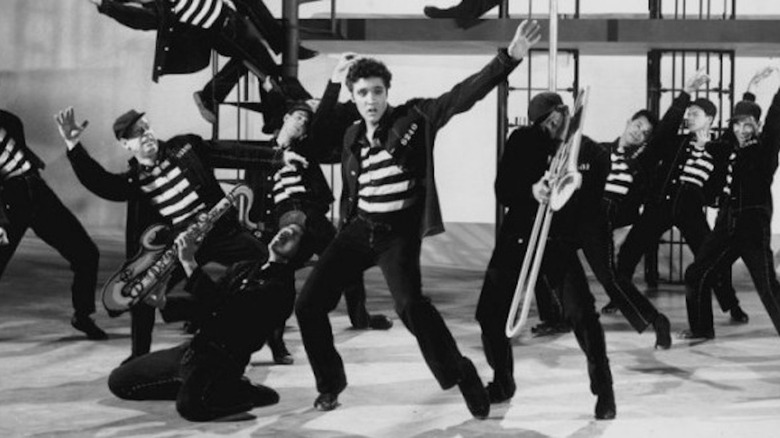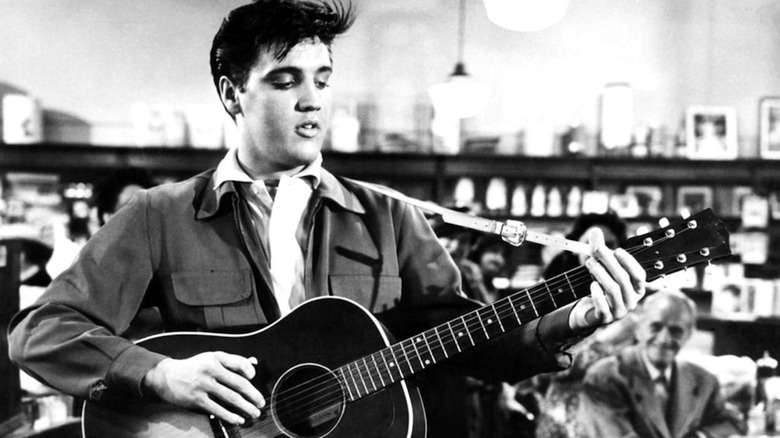The 8 Best Elvis Presley Movies, Ranked
The moment Elvis Presley stepped in front of the camera for his second appearance on "The Milton Berle Show" in 1956, there was no doubt that this young man was destined for more than pop music superstardom. Much more.
Conversationally, he was downright adorable with his boyish good looks and aw-shucks Southern shyness, but once the music kicked in he was transformed into a hunk of burning lust. That gyrating pelvis and run-riot voice spurred awakenings in living rooms across the country (in full view of outraged parents). To teenagers, Elvis belted out a call to rebellion. To parents, he was a pompadoured incubus. To Hollywood, he was singing, swaggering box-office gold.
Between 1956 and 1972, Elvis starred in 31 features and two concert films. There were lulls (particularly when his popularity faded prior to his 1968 comeback special), but for the most part Elvis reliably packed 'em in. According to producer Hal B. Wallis (who made nine movies with The King), "A Presley picture is the only sure thing in Hollywood."
What Elvis didn't do most of the time was act. With very few exceptions (all coming early in his career), Elvis played Elvis. Though he did harbor loftier artistic ambitions (he was obsessed with James Dean), he was determined to give his fans what they wanted — and after the shaky commercial performances of "Flaming Star" and "Wild in the Country," it was clear they wanted an edges-sanded-all-the-way-down pop star, not a moody, Method-y actor.
As a result, Elvis movies are mostly formulaic goofs that use their plot as an excuse to shill the singer's new music. Many of them are pretty awful, but he managed to topline a number of fun-and-frothy concoctions. For my money, this is Elvis at his big-screen best.
8. Wild in the Country (1961)
I'm tempted to go with 1962's "Kid Galahad" here (because where else are you going to see Charles Bronson train Elvis to box), but it's a disappointingly listless walkthrough of Michael Curtiz' superior 1937 original featuring Edward G. Robinson, Bette Davis and a pre-stardom Humphrey Bogart.
This misfire from director Philip Dunne and a slumming Clifford Odets is far more intriguing. Based on the critically acclaimed novel by J.R. Salamanca (whose "Lilith" was turned into a wildly underrated Warren Beatty-Jean Seberg vehicle by Robert Rossen three years later), "Wild in the Country" wound up being Elvis' last attempt at something close to acting. Elvis' sensitive bad boy is cut from the same ruffled cloth as Dean's Jim Stark in "Rebel Without a Cause," but, at the age of 25, there's a sense that he's well beyond saving — and he knows it. There's a potentially thorny May-December dynamic between Elvis and his court-appointed psychiatrist played by Hope Lange (who, in classic Hollywood fashion, was only two years older than her co-star), but the film can't go there. There's also a chance for something dangerously licentious between Elvis and a scorching Tuesday Weld, but, again, Elvis had an image to sanitize.
Odets, who was worn out by Hollywood and in failing health, apparently couldn't finish the screenplay, so Dunne, no slouch in the writing department (he penned Best Picture-winner "How Green Was My Valley" for John Ford), fired him. Elvis' obligatory song breaks are especially jarring, but, taken on its own, the title track is a terrific tune.
7. Love Me Tender (1956)
Elvis' feature debut was, strangely, this Richard Egan vehicle that was retroactively turned into a quasi-musical due to the nascent pop star's casting.
Everything was happening fast for the momma's boy from Tupelo, Mississippi; he scored his first Billboard #1 hit weeks after shooting his screen test for "Love Me Tender," which was a rough break for 20th Century Fox contract star Egan. By the time the film, originally titled "The Reno Brothers," hit theaters on November 15, 1956, the country's teenagers were set to turn the formulaic Civil War-era Western into a de facto Elvis Presley concert. Anticipating a windfall, Fox rechristened the movie after Elvis' latest chart-topper. Sure enough, teens flooded their local cinemas and, in some cases, screamed their way through the film.
So is the movie any good? Not really, no. It is, however, a fascinating pop cultural artifact. Even though he's ostensibly a supporting character, the film belongs to Elvis. Amazingly, the producers stuck to their guns and killed off Elvis' character in the climactic shootout (though the star shot an awkwardly tacked-on performance to assuage the grief of his fans at the end of the movie). As for his acting, Elvis comes off no better or worse than your average up-and-coming teen idol, which is disappointing. The danger of his "The Milton Berle Show" appearance from earlier in the year is nowhere in evidence. It's respectful, eager-to-please-the-establishment work. He's good, but we needed him to be bad.
6. Loving You (1957)
Elvis' first tailor-made star turn is essentially a riff on his rags-to-riches origin story. It's a showbiz tale of a blue-collar kid with a million-dollar voice who overcomes the usual obstacles to become the superstar he was always destined to be. This could've been an insultingly pat vehicle for Elvis — and, coming on the heels of "Love Me Tender," it dispiritingly reinforced Colonel Tom Parker's limiting vision for this generational talent's career. But as an Elvis showcase, it delivers the goods in VistaVision and Technicolor.
Director Hal Kanter wrote the screenplay with Herbert Baker, and their edict seemed to be "Don't challenge the boy." Alas, they play it too safe. Dramatically, this is Elvis taking batting practice. He knows his lines (and, being an above-and-beyond professional, apparently learned everyone else's lines, too) and hits his marks a tad too dutifully. The highlights are all on stage, and what I wouldn't give to see The King shred "(Let Me Be Your) Teddy Bear" in proper VistaVision.
5. Blue Hawaii (1962)
It's a pitch worthy of Jack Lipnick: "Elvis picture. Hawaii. Whaddya need, a road map?" Norman Taurog, a Hollywood veteran who'd served stylish servitude to the likes of Mickey Rooney, Judy Garland, Bob Hope, Bing Crosby and holy terror Jerry Lewis got the assignment, and absolutely aced it. The only problem is the meagerness of the assignment.
"Blue Hawaii" is an autopilot Elvis Presley film. The star returns from U.S. Army service (a cheeky nod to The King's own stint in the military), and is thrust into a low-stakes drama about giving up his life of tropical leisure to inherit the family's lucrative fruit company business. There's nothing exceptional about the plot, but Paramount once again gifts Elvis with the gaudy glory of Technicolor and VistaVision. It's the country's biggest star projected (ideally) onto the world's biggest screens. After the frustratingly conflicted "Wild in the Country," you appreciate the aesthetic candor.
And you can't argue with the cast, especially Angela Lansbury, who seems delighted to play the daffy mother of a coasting, privileged brat (despite only being 10 years older than him). Elvis, as ever, springs to life when it's time to sing. "Can't Help Falling in Love" was one of his biggest 1960s hits, but the highlight of the film is easily the energetic "Rock-a-Hula Baby."
4. Flaming Star (1961)
If Elvis was ever going to break with the formula established in "Love Me Tender," it would've been via this Don Siegel-directed Western in which the pop star problematically plays a half-Kiowan rancher forced to confront his mixed heritage when his tribe-by-blood declares war on caucasian settlers.
Siegel would eventually become an A-list director when he hooked up with Clint Eastwood for "Coogan's Bluff" and "Dirty Harry," but he was still operating as a B-level hired hand in 1960 (he'd shot a Fabian movie the year prior). Still, he was a proficient, tough-minded genre filmmaker who loathed flab. His best films ("Invasion of the Body Snatchers," "Riot in Cell Block 11" and "The Lineup") were lean and mean, and he was keen to impose some kind of austerity on the self-indulgent sprawl of Presley's pictures.
This is fairly close to a real film. There are only two songs, and then Siegel gets on with the surprisingly rugged tale. The problem is that Elvis has adopted numerous movie star tics, and he can't fully disappear. It's a noble effort, but while it's a joy to see him interacting with top-notch character actors like L.Q. Jones and Richard Jaeckel, he seems out of place. This was a stepping stone film, but when Elvis' fans mostly rejected it, he never took that next step.
3. Viva Las Vegas (1964)
Director George Sidney had just worked with Ann-Margret on the Elvis-inspired musical "Bye Bye Birdie," so there was a sense of kismet in the duo coming together to make a genuine Elvis movie. And while they did not elevate the star's tried-and-true formula, they captured its quintessence.
"Viva Las Vegas" could've been one of The King's tiresome car racing movies, but the automotive nonsense takes a back seat to the steel-melting heat generated by the two stars. Elvis and Ann-Margret want every part of each other. This isn't acting. They are ready to go. For the first time in his movie career, Elvis had met his sizzling onscreen match, so of course the human cesspool named Colonel Tom Parker made sure they never worked together again (he also cut two of their three songs from the film).
"Viva Las Vegas" is arguably Elvis' most satisfying audience movie. It zips by at 85 minutes, and revels in its floridness. It's Elvis in Sin City with an eager-to-transgress screen partner. In an ideal world, Elvis would've had better counsel and made a series of films with Ann-Margret. We wuz robbed.
2. Jailhouse Rock (1957)
For people who didn't grow up with Elvis Presley as a showbiz institution, this is the film that makes the most emphatic case for his one-of-a-kind stardom. It's nothing special. It's a B-movie with a hackneyed, occasionally laughable plot (the final twist is a sitcom-level complication), but it was shot in 1957 while Elvis was on top of the world, and this wound up being the role he was born to play.
You've seen this movie before. Elvis gets thrown in jail for accidentally killing a man, discovers he's got untapped musical talent and, upon his release, skyrockets to stardom. Once he's at his peak, he turns into a selfish jerk, which leads to him almost losing everything.
This is not Spike Lee's "Mo' Better Blues." Elvis' character regains his voice, and, duly chastened, reclaims his celebrity perch while making everything right with the vital people in his life. It's rote as hell, but Elvis is so incredibly present in every scene; his co-stars clearly understand they're a part of something epochal, and when he performs the title track in a scene you've surely seen dozens if not hundreds of times in your life, you share their awe. This. Is. Elvis.
If you can watch this and shrug the man off — the voice, the charisma — go with God.
1. King Creole (1958)
There's an alternate universe where Elvis Presley would've hit the big time a decade earlier during the peak of the film noir era, where a big-time director like Billy Wilder or Michael Curtiz would've wedded the star's country guilesness with his below-the-belt savvy in a gritty crime drama.
Oh wait, that happened. And why didn't it happen again? Oh right, Colonel Tom Parker.
Curtiz was 72 and had four years left in the tank when he agreed to make an Elvis Presley movie. Let's make this clear: the man who directed "Doctor X," "The Adventures of Robin Hood," "Casablanca" and "Yankee Doodle Dandy" consented to shooting a film that basically existed to sell a soundtrack. Because that was, all divergent aspirations aside, Elvis' deal: you make the movie, the kids see the movie, the kids run out and buy the new music.
"King Creole" is different from every other Elvis Presley film in that he's actually directed. No one, save for stray moments in the Siegel or Dunne movies, could get Elvis to forget the camera and play a character. His Danny, a 19-year-old screw-up who gets caught up with a two-bit gangster (Walter "freaking" Matthau), could've been a breakthrough performance had the film dispensed with the yet-to-calcify Elvis formula. Curtiz, to his credit, integrates the musical numbers into the narrative more deftly than the star's subsequent collaborators outside of Siegel, but the film still feels like a novelty. It's an audition for the role that Elvis was never allowed to play.
